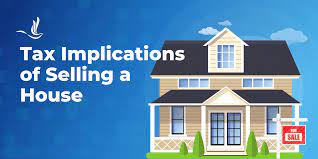Introduction to Home Sale Tax
Selling your Home Sale Tax can be an exciting but complex process, especially when understanding the tax implications. Many homeowners may not realize that the profits from the sale of their home could be subject to taxes. In this guide, we’ll explore everything you need to know about home sale tax to help you navigate this aspect of selling your property with confidence.
Table of Contents
What is Home Sale Tax
Home sale tax, also known as capital gains tax, is a tax imposed on the profit you make from selling your primary residence. When you sell your home for more than you paid for it, the difference between the sale price and the original purchase price is considered a capital gain and may be subject to taxation.
Understanding Capital Gains

Capital gains are categorized into two types: short-term and long-term. Short-term capital gains apply to assets held for one year or less, while long-term capital gains apply to assets held for more than one year. The tax rate applied to capital gains depends on various factors, including your income level and the length of time you held the asset.
Calculating Home Sale Tax
To calculate the home sale tax owed on the sale of your property, follow these steps:
1. Determine Your Basis
Home Sale Tax: Your Comprehensive Guide to Understanding
Your basis is the original purchase price of your home, plus any qualifying expenses such as closing costs, legal fees, and home improvements. Subtract this amount from the sale price of your home to determine your capital gain.
2. Apply Exclusions

The Internal Revenue Service (IRS) allows certain exclusions that may reduce or eliminate the capital gains tax owed on the sale of your home. The most common exclusion is the H4: $250,000 Exclusion for Individuals and H4: $500,000 for Married Couples. To qualify for this exclusion, you must have owned and lived in the home as your primary residence for at least two of the past five years.
3. Calculate Capital Gains Tax
If your capital gain exceeds the exclusion amount, you’ll need to calculate the capital gains tax owed. The tax rate applied to your capital gains depends on your filing status and total taxable income for the year. Consult the current IRS tax brackets to determine the applicable tax rate.
Strategies to Minimize Home Sale Tax
While home sale tax is an inevitable part of selling your home, there are several strategies you can employ to minimize or mitigate the tax impact:
1. Use the Exclusion Wisely

Take advantage of the H4: $250,000 Exclusion for Individuals and H4: $500,000 for Married Couples by timing your home sale to ensure you meet the eligibility requirements. Consider consulting with a tax professional to develop a strategy that maximizes your tax benefits.
2. Keep Records of Home Improvements
Maintain detailed records of any home improvements or renovations you make, as these expenses can be added to your basis and reduce your capital gain. Be sure to keep receipts, invoices, and documentation of the work performed.
3. Consider Tax-Deferred Exchanges
If you’re planning to reinvest the proceeds from the sale of your home into another property, consider a tax-deferred exchange, also known as a H4: 1031 Exchange. This allows you to defer paying capital gains tax on the sale of your current property if certain criteria are met.

Conclusion
In conclusion, understanding home sale taxis is crucial for homeowners looking to sell their property and maximize their profits. By familiarizing yourself with the basics of home sale tax and implementing strategic planning techniques, you can minimize your tax liability and make the most of your real estate investment. Whether you’re a first-time seller or a seasoned homeowner, consulting with a tax professional can provide valuable guidance and ensure you navigate the process with confidence. So, before you list your home for sale, take the time to educate yourself about home sale tax and make informed decisions that benefit your financial future.

